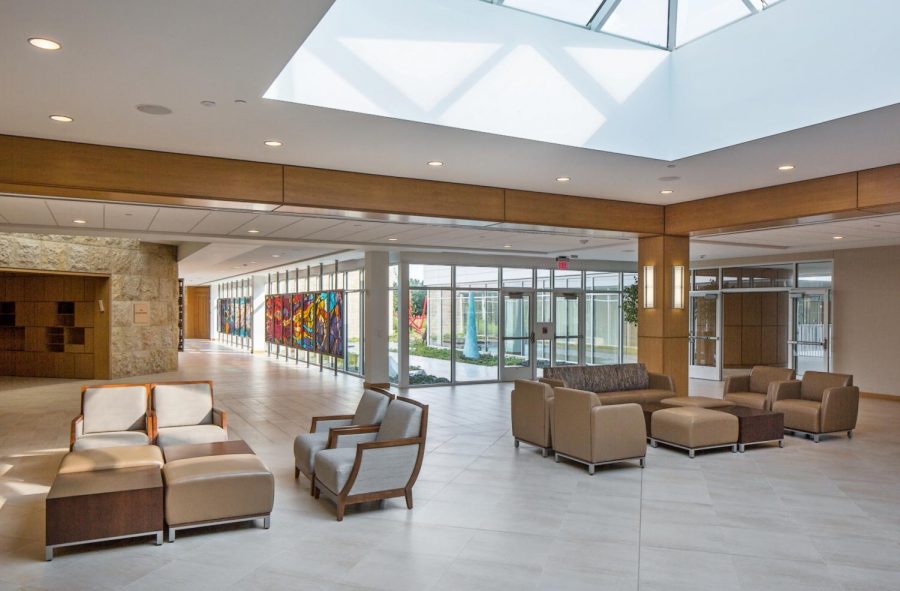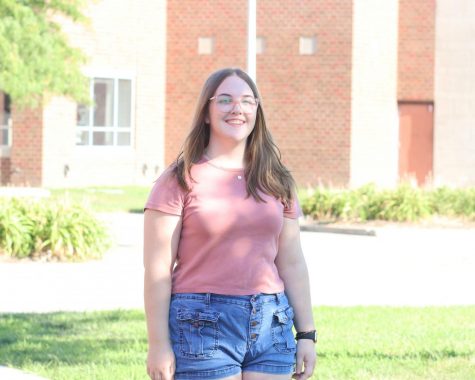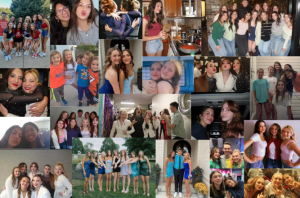Promoting empowerment
Sophomores attend an inclusion workshop
photo courtesy of Temple Israel
The 2019 Promoting Empowerment workshop was held at Temple Israel, the oldest Jewish reform synagogue in Omaha.
November 11, 2019
On October 30, 12 sophomores attended a Promoting Empowerment in Our World Workshop for sophomores in the metro area. Teachers nominated the students based on their leadership abilities. The workshop was sponsored by the Anti-Defamation League, whose primary goal is to reduce bigotry through education and focused on giving students a space to hold discussions about tolerance, bigotry, diversity and inclusion.
The workshop was held at the Temple Israel which is part of Omaha’s Tri-Faith initiative. This initiative seeks to foster acceptance among Omaha’s three largest religions with an ongoing project to unify the temple, a mosque and a church to breed cross-cultural acceptance. It was the ideal setting for students to work towards a more inclusive and understanding world.
“The Islamic Institute of America, the Countryside Community Church and the Temple Israel all decided that they were gonna build their new locations on one site and share the space,” social studies teacher and Justice and Diversity League sponsor Bryant Bull said. “They wanted to promote cross-cultural cooperation and understanding which is basically the goal of the Promoting Empowerment workshop.”
Upon arrival, participants met in the banquet hall and did school introductions before receiving their small group numbers. From there, Millard West students were separated from their classmates to be with students from other schools during small group time. The initial awkwardness of being around strangers from different schools was quelled by an ice breaker activity that involved building pipe cleaner sculptures and doing a question and answer. Within five minutes of meeting each other, students were talking about their dream vacation spots, experiences with harassment and the part about their identity that they feel most proud of.
“I liked the pipe cleaner activity because we got to learn more about each other and see what made up their lives and morals,” sophomore Emily Longe said. “It was a little awkward at first, but after we started talking more and getting more comfortable, people got less afraid to actually share things.”
The purpose of separating students into small groups with different kids was to create a space where they could hear experiences that may not reflect their own. The diversity within the groups facilitated discussions about differences in school culture based on demographic makeup and geographic location. Groups were able to reflect on the racial makeup of school administration, harassment on campus and the inclusiveness their school environment allowed for people of different backgrounds.
“I actually really liked being away from other West students that I know because I felt like it was easier to speak my mind without worrying about people seeing me differently at school,” sophomore Addie Smith said. “I really liked hearing people’s perspectives from different areas.”
Much of the day consisted of productive discussion and discourse. Conversations were sparked by different activities and prompts. During one of the first activities, sophomores fiddled with their pencils while they held conversations about diversity guided by the concept of an identity iceberg. Some hesitantly opened up about their own experiences of people making assumptions about them.
“Everyone in our group felt like they could be themselves even if they don’t always feel like that at school,” Smith said. “A lot of people really opened up about their personal lives and some of the problems they go through and it made me see things differently.”
By the time the morning was almost halfway through, most of the students were confidently sharing personal stories and reflecting on the escalation of hate in society while they looked at how unconscious bias can escalate into discrimination, violence or genocide. Participants were asked to be more critical and look at their own biases. They brainstormed methods for confronting stereotypes and prejudice within their classes and peer groups to keep it from escalating into violence.
They were also asked to connect their knowledge of terms like hate crimes, stereotyping, scapegoating and discrimination with real-world examples. These types of activities forced students to dig deeper, go beyond dictionary definitions and listen to other students share about how these concepts have impacted them.
“It just crazy how you’re living in your own personal world and not worrying about everyone else but once you hear how different everyone’s lives are based on things like economic status, you start to see beyond your small world and realize there are other perspectives,” sophomore Nevin Butler said.
Along with guiding self-reflection and group discussions, the organizers gave sophomores tools to create change in their own schools. They learned strategies for standing up to stereotypes and potential violence and walked through what they might do if faced with the chance to challenge discrimination and prejudice.
“One of the things we talked about was leading by example,” Butler said. “You can’t control anyone else and if someone wants to be stubborn and not see your side then there’s nothing you can do besides lead by example and be the best person you can be.”
One of the favorite activities among participants was the Agree or Disagree game. The small group leaders read opinion statements about controversial topics such as ‘athletes should be punished for kneeling during the national anthem.’ Participants placed themselves around signs labeled strongly agree, agree, disagree and strongly disagree. A few students then had to share their reasoning for their beliefs.
“I loved the agree or disagree game because it was really interesting to see how some people who are really different would agree while some people who are more similar would disagree on other things,” Smith said.
After a long yet productive morning, students were dismissed for lunch. They devoured Valentino’s pizza and brownies and sipped on apple juice while catching up with their Millard West peers about all that had happened so far. They told each other about heated gun control debates they had during the ‘agree or disagree’ game and interesting conversations they had about segregation in Omaha during the ice breaker activity.
For the final part of the day, small groups dispersed and met back up with their schools. The Millard West sophomores gathered in a hot, narrow room at the bottom floor of the temple. After having the first part of the day to hear perspectives from different schools, the students got to share what they thought about their own school’s culture and environment. While all 12 students have had different experiences, they all agreed that some of the biggest issues at West are gossip, rumors, stereotypes and offensive slurs.
“I don’t think that has ever changed,” Bull said. “It’s almost always the same issues coming back up. I think that the best way to combat that is by forcing students into situations where they have to interact in an equal environment with other students and make a cooperative effort.”
The closing discussion involved making an action plan for how to tackle these issues in school. For Millard West, a major goal with this workshop was the chance to become a No Place for Hate school again after four years without the banner hanging in the halls. The school needs to meet certain requirements each year to hold the title of a ‘No Place for Hate’ building. This includes a minimum of three activities that engage the majority of the school and offer follow up discussions or opportunities.
“The idea is to promote inclusion and empathy and try to defeat this bullying culture that exists in our environment,” Bull said. “We have to get the majority of students to say that they want to make this a prejudice-free zone, fight against ignorance and hate and promote inclusion for all students.”
At the end of the day, the 12 sophomores chatted excitedly while they climbed onto the bus. They reflected on their experiences and talked about the ways they would take what they learned back to school. From here, they realized, the challenge would be keeping up this excitement as they work to make change in their school.







